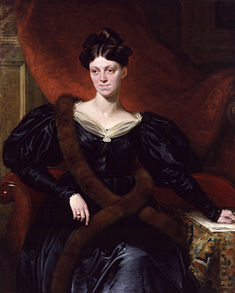English sociologist and writer Harriet Martineau was born
on June 12, 1810. Martineau is
remembered here for her bio of Walter Scott’s son-in-law, John Gibson Lockhart,
which includes an account of Lockhart’s meeting Scott.
‘…After
the Peace he went to Germany a not very common undertaking at that time and saw
Göthe; and his account of this incident seems to have struck Scott, when they
who were to become so closely related met for the first time in private
society, in May, 1818. A few days after the dinner-party at which this
happened, the Messrs. Ballantyne sent to Lockhart, to propose that he should
undertake a task which Scott had delayed, and wished to surrender: the writing
the historical portion of the "Edinburgh Annual Register" for 1816.
When he called on Scott to talk it over, the great novelist, who was then
receiving 10,000£ a year from the new vein he had opened, assigned a
characteristic reason for giving up the Register. He said that if the war had
gone on, he should have enjoyed writing the history of each year as it passed;
but that he would not be the recorder of Radical riots, Corn Bills, Poor Bills,
and the like. These things, he said, sickened him; and he thought it fair to
devolve such work upon his juniors. Mr. Lockhart first saw Abbotsford the next
October, when he was sent for from Elleray, with his friend John Wilson, to
meet Lord Melville, and take the chance of some professional benefit arising
from the interview with the First Lord of the Admiralty, if their sins in
Blackwood could be overlooked by him. This shows that Blackwood's Magazine was
already rising under the re-enforcement of Wilson's strength. The strength
which raised it was not Lockhart's. His satire had, then and always, a quality
of malice in it, where Wilson's had only fun; and he never had Wilson's
geniality of spirit. Wilson's satire instructed the humble, and amused the
proud who were the objects of it; but Lockhart's caused anguish in the one
case, and excited mere wrath or contempt in the other, Scott confessed that it
might be from complacency at Lockhart's account of this visit to Abbotsford
that he judged so favorably of "Peter's Letters to his Kinsfolk,"
which appeared a few months afterward. He called its satire lenient; but all
the Edinburgh Whigs were up against it as a string of libels; and Lockhart
himself tells us candidly that it was a book which none but a very young and a
very thoughtless person would have written…’

No comments:
Post a Comment
Note: Only a member of this blog may post a comment.